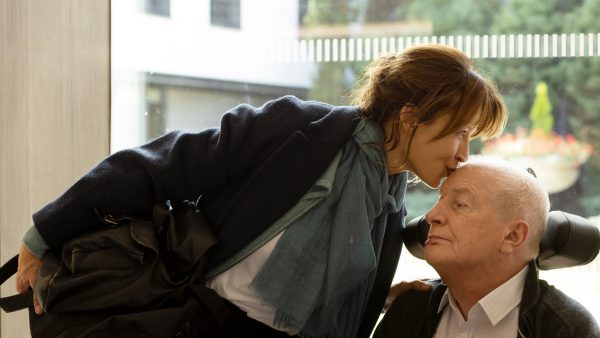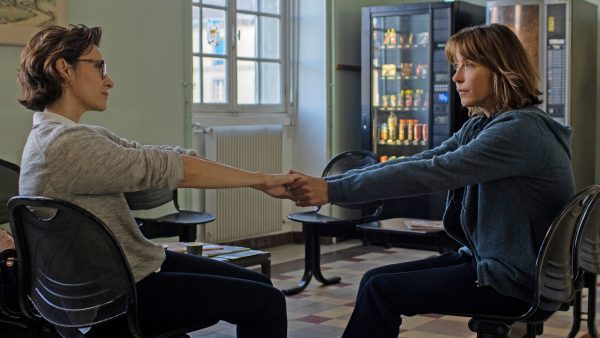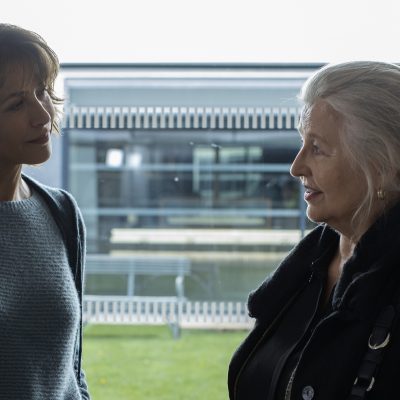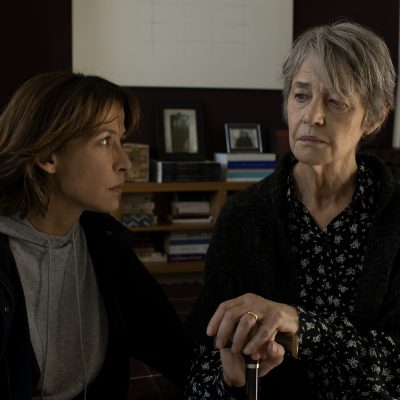
“Everything Went Fine” (“Tout s’est bien passé”) (2021 production, 2023 release). Cast: Sophie Marceau, André Dussellier, Géraldine Pailhas, Charlotte Rampling, Éric Caravaca, Hanna Schygulla, Grégory Gadebois, Judith Magre, Jacques Nolot, Daniel Mesguich, Nathalie Richard, Annie Mercier, Catherine Chevallier, Quentin Redt-Zimmer, Alexia Chicot, Madeleine Nosal Romane, Karim Melayah, Aymen Saidi, Toudo Cissokho. Director: François Ozon. Screenplay: Eammanuèle Bernheim, François Ozon and Philippe Piazzo. Web site. Trailer.
André’s caregivers freely acknowledge that he’s experienced quite a setback. But, despite the seriousness of his condition and the real possibility of further decline, they’re also surprisingly optimistic for recovery, at least to a certain degree. His life may not be what it once was, but his physicians are hopeful that he’ll be able to get back some of what he’s lost, news that raises the spirits of his daughters. However, André quietly has his doubts, despite some encouraging progress.

As someone who’s always been accustomed to getting his way (and not having had anyone in his life who would dare challenge his wishes), André expects the same now, despite his infirmity. But, when the stubborn, strong-willed, single-minded curmudgeon realizes that he won’t be all he once was, he decides he wants to bring his life to an end. He also understands that he can’t accomplish that himself, so he turns to someone for help – Emmanuèle.
Despite the harsh treatment she’s experienced in her relationship with her father, Emmanuèle loves him, though this request throws her an unexpected curve. She wants to do right by him, though she has serious reservations about whether she can comply with his wishes. And, when she makes those doubts clear, André becomes his old demanding self, insisting that she follow through on his dictates.
Emmanuèle is unsure how to proceed. She consults Pascale, who is strongly opposed to the idea. She strongly encourages her sister to dissuade him about the notion, but that argument comes easier for Pascale, given that she apparently never suffered the same degree of parental abuse that her sibling experienced. And, to her credit, Emmanuèle admits that she won’t proceed with the plan unless she has Pascale’s agreement. However, given her love for André and her reluctance to decline his request, she does her best to try and win over her sister’s concurrence, a decision made more difficult in light of her father’s steady recuperation. But André’s mind is mind up, despite whatever progress he’s made – he wants out, and the sooner the better.
Having secured Pascale’s begrudging consent, Emmanuèle begins looking into what an assisted suicide would entail. Given that such practices are illegal in France, Emmanuèle quickly realizes that, if the procedure is to be carried out, she and André will need to arrange for it to be conducted elsewhere, the nearest potential venue being in neighboring Switzerland. She contacts a Swiss organization that helps to arrange such procedures and agrees to meet with one of its representatives in Paris.

Considering the sensitive nature of this venture, virtually every aspect of it is handled clandestinely to prevent word from getting out to French authorities prepared to step in and stop it, even if the procedure is to be conducted out of the country. Indeed, in making the arrangements for it, even the name of the organization’s representative is kept secret; in all her dealings with Emmanuèle, she discreetly goes by the ambiguous code name “the Swiss lady” (Hanna Schygulla).
When Emmanuèle and Pascale meet with their Swiss contact, they discuss the details, which turn out to be quite specific, detailed and extensive. For example, in order for the organization to be able to legitimately assist the family, André must demonstrate that his medical status is truly dire (with medical records to verify his condition) and that he’s not an individual who’s depressed and simply trying to do himself in, particularly if he’s showing signs of improving health. He must also demonstratively signal and document his sincere desire to bring his life to an end. There’s a mountain of paperwork to be completed in connection with all this, as well as a carefully orchestrated series of logistical considerations that must be arranged to transport the patient from Paris to Bern, where the procedure will be conducted. And, of course, there’s the high cost involved, but, given André’s ample financial resources, this, fortunately, is not a problem for him and his family.
Even though André would like to get this over with as quickly as possible, the time involved is longer than he would like. And, given his growing inability to keep secrets, he invariably says more than he should about what’s in the works, leaving him and his daughters potentially exposed to the prying eyes of French authorities, as well as the potential liability that could be involved. Clearly this is an undertaking that’s more complicated than the family anticipated.
But the legal arrangements are just one part of the stresses involved. There’s also the emotional turmoil to contend with. It’s not so much an issue for André as it is for his daughters, as well as the patriarch’s grandchildren, Raphael (Quentin Redt-Zimmer) and Noémie (Alexia Chicot). Through all this, however, the greatest burden is placed on Emmanuèle. She’s torn between carrying out her father’s final wishes and dealing with her own opinions on the subject. She’s also aware that time is running out to reconcile her feelings about André, both in terms of her love for him and the hurt she experienced during her childhood. What’s more, she’s also having to contend with the failing health of her mother (Charlotte Rampling), a Parkinson’s patient who has been in a state of decline for some time, particularly after her divorce from her husband. It’s quite a full plate on top of everything else.

As the story plays out and the proposed deadline approaches, it remains uncertain whether events will unfold as projected given the legal requirements, logistical arrangements and emotional considerations involved. There’s even the possibility, as the Swiss lady observes, that the patient might change his mind as the time approaches, as sometimes happens in cases like these. And, of course, there’s always the possibility that word of the impending events will reach authorities before the story concludes. How will it end? That remains to be seen.
In making her decision, Emmanuèle needs to look within, to examine her beliefs, for not only will they help her make a choice, but they will also help to determine how events unfold. That’s what happens with the conscious creation process, the philosophy that maintains we draw upon these intangible resources in manifesting the reality we experience. Emmanuèle may not have heard of this school of thought, but she’ll need it to get through the upcoming ordeal and, one would hope, to reach a satisfactory conclusion.
Considering the complexity of this situation, Emmanuèle clearly has a bundle of beliefs to sort out. To begin with, she needs to examine her feelings about the prospect of assisted suicide in principle and how it applies to her own family’s circumstances. Then she has to sort out her beliefs about her relationship with André – both sides of the love/hate equation she has where he’s concerned, as well as how willing she is to comply with his wishes. She also has to take into account Pascale’s feelings, seeing as how she stated that she would not proceed with this venture without her agreement. And then, of course, there’s the decision itself, which combines all of the foregoing considerations. Just talking about all of these concerns would seem to render this an almost impossible decision to make.
In reaching a determination, Emmanuèle needs to employ her power of discernment to make a decision. She needs to go through all of the foregoing beliefs and prioritize them. This calls for a precise weighting and delicate balancing of all of the pertinent considerations, a sorting process that, regrettably, may be anything but easy. But, given the emotionally charged conditions involved here, it’s a necessary step that she must take.
In particular, Emmanuèle must seek to allay any fears that might be getting in the way, as they’ll hold her back in reaching the necessary determination. She must consider, for example, whatever anguish might be associated with the process of attempting to balance her personal opposition to assisted suicide against the pain of letting down her father by denying him his final wish. How does she reconcile such considerations? That’s what she needs to figure out, using her beliefs to do so. And fears, like all of the other concerns involved, are another form of belief to be dealt with.

Movies about assisted suicide and the right to die have made their way into the cinematic lexicon over the years, and many of them have given just treatment to the subject, as evidenced by such titles as “Blackbird” (2018), “You Don’t Know Jack” (2010), “Whose Life Is It Anyway?” (1981) and “The Barbarian Invasions” (2003). And now writer-director François Ozon’s latest feature outing can be added to that list. This fact-based drama capably and comprehensively examines this topic from a variety of angles, and it does so with a great deal of integrity, authenticity and heartfelt feeling. It’s also one of the finest, most accessible offerings from a filmmaker whose works I usually believe leave much to be desired. However, the filmmaker has come through admirably here with material that could be easily mishandled if left in the hands of a less skilled director. With that said, however, that’s not to suggest that this release is without its issues, such as several story threads that don’t feel fully resolved, along with some occasionally strange camera work and seemingly superfluous narrative elements. Nevertheless, “Everything Went Fine” has much in its favor, including excellent performances by its three principals (Marceau, Dussellier and Pailhas), an inclusive script, sustained pacing, well-placed moments of comic relief, and genuine emotional impact without becoming manipulative or schmaltzy. If you can look past this offering’s minor shortcomings, you’ll come away from it having had a moving and insightful cinema experience, as well as a thoughtful meditation on when it’s time to stay and when to go. The film is available for streaming online.
Copyright © 2023, by Brent Marchant. All rights reserved.

No comments:
Post a Comment